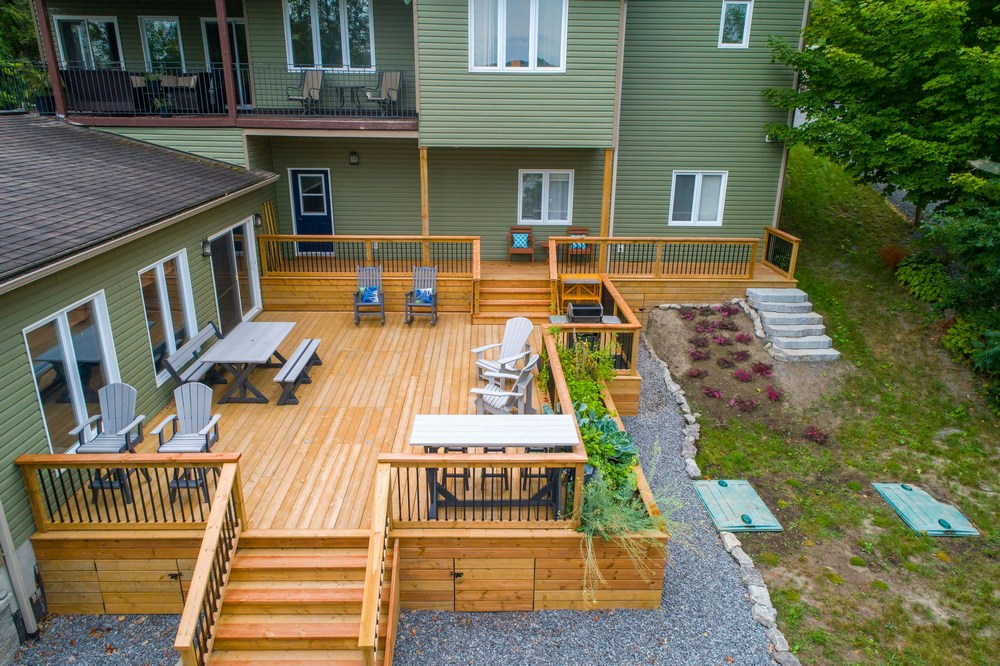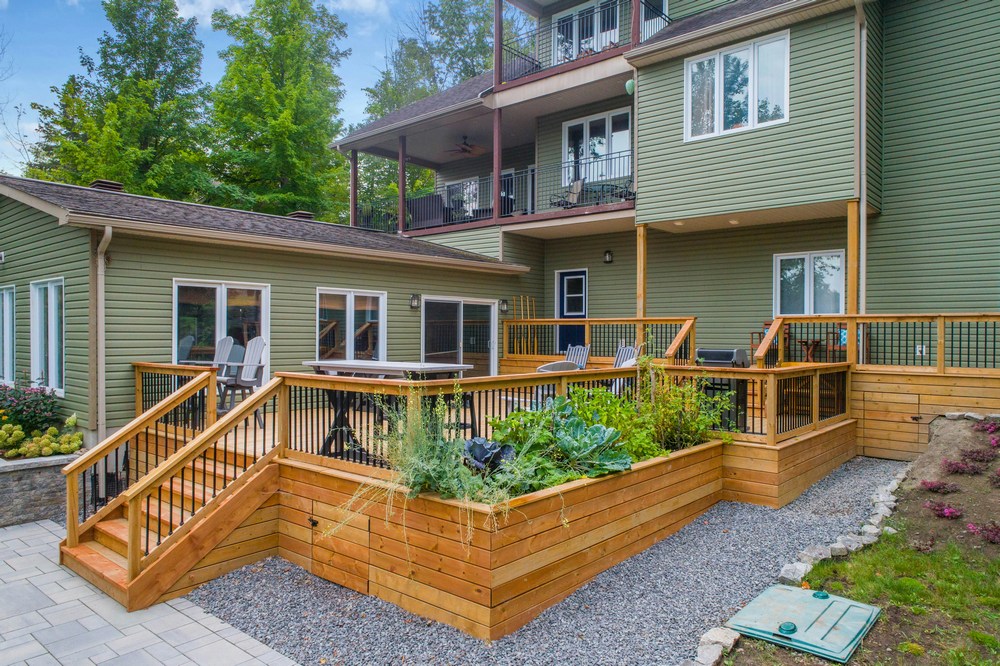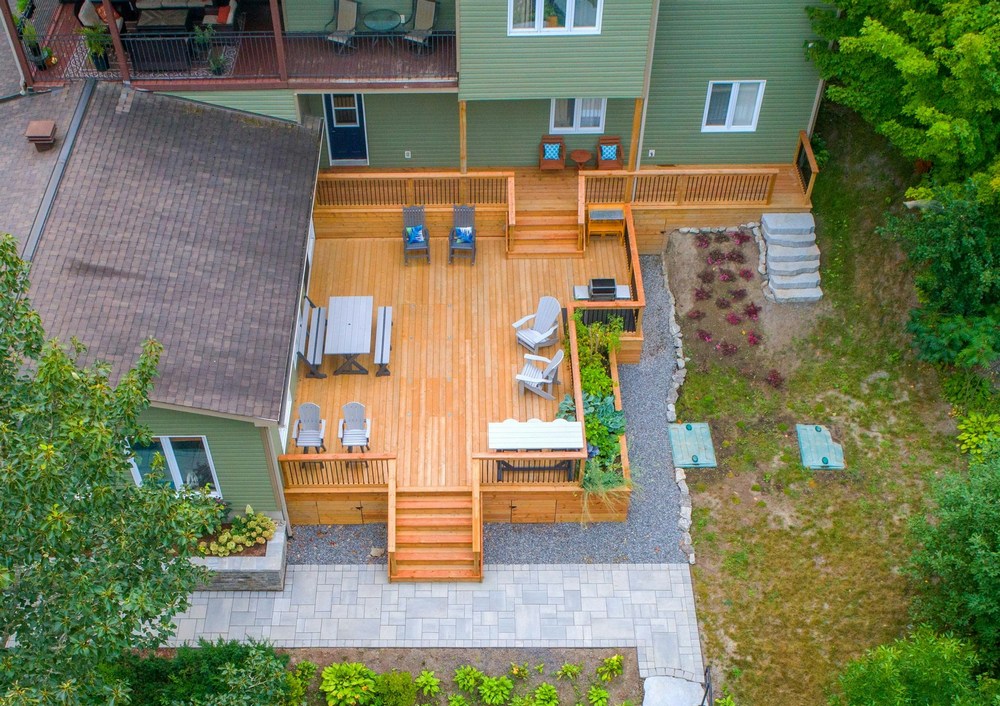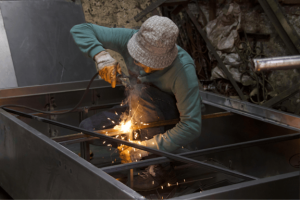Last Updated on October 23, 2025 by teamobn
Adding a deck to your home is an effective way to increase your property’s value, functionality, and the aesthetic appeal of your outdoor space. Whether you intend to entertain guests, build a cozy outdoor retreat, or simply enhance your backyard, constructing a deck can be challenging and time-consuming, requiring careful planning and consideration.
Creating Your Dream Deck: 8 Important Factors to Consider
In this article, we explore eight key factors to consider when building a deck to boost longevity, durability, and safety.
Location
Choosing the best spot is critical, especially when there’s no apparent space where the deck should go. Before picking a spot, ensure you comprehensively understand the environmental factors that can impact your deck’s longevity, integration, and comfort. Below are factors you should consider when choosing an appropriate location for your deck.
Before finalizing your plans, it’s also worth considering whether a deck or a patio is better for your space to ensure your investment suits both your lifestyle and your property layout.
Proximity To The House
Building your deck adjacent to your house can be ideal as it provides easy access to indoor amenities like the bathroom and kitchen. However, the exact positioning can affect the flow between the outdoor and indoor spaces.
For instance, positioning the deck near the living room can extend the entertainment space while building it near the kitchen makes outdoor dining convenient. Be sure to consider the intended purpose of your deck when choosing the correct positioning.
Terrain and Ground Conditions
Be sure to assess the topography of your yard before taking on the deck construction project. While a flat, level area is ideal for straightforward construction, a sloped or uneven terrain provides opportunities for creative designs, including raised platforms or multi-level decks.
Drainage and Water Flow
The last thing you want is water to pool under your deck, as this could result in mildew, wood rot, and structural problems. For this reason, choose a spot where water naturally flows away from the deck, or consider adding a drainage system into your design.
Privacy
Be sure to pick a location that provides a balance between privacy and openness. If you prefer a secluded space, position the deck away from your neighbor’s view or use natural barriers like shrubs, trees, and fencing to create a sense of privacy. Placing your deck in a more open, central location may be ideal if your deck is meant to be a social hub.
The materials you choose when building a deck have a significant impact on its level of maintenance, durability, and appearance. Common decking materials include:
- Wood. Wood provides a natural and classic look. However, wood requires regular maintenance, such as sealing and staining, to maintain its aesthetic appeal and prevent rot and weather damage. You could invest in redwood, cedar, or pressure-treated wood.
- Composite. This decking material is made from a blend of plastic and wood fibers. Composite requires little or no maintenance and is resistant to fading, insects, and rot. However, composite decking material is more expensive upfront.
- PVC. This decking material is fully synthetic. It’s highly durable and resistant to mold, moisture, and insects. PVC is also easy to maintain. However, it lacks the warmth of wood.
Be sure to consider your budget, desired aesthetics, and the time you’re willing to spend on maintenance when choosing appropriate decking materials.
Building Codes and Permits
Different states have distinct building codes that dictate the height of the deck, railing requirements, and how the deck should be anchored to the house. Be sure to familiarize yourself with your region’s local building codes and obtain necessary permits before starting the construction project.
If you fail to comply with the local codes, you could incur fines and legal issues or even have to bring down and rebuild the deck, which is costly. Consider partnering with a local contractor, especially if you’re unfamiliar with your local building codes, to help you understand specific requirements in your area.
Size and Layout
When establishing the appropriate size and layout of your deck, consider your needs and the available space. While a large deck could be ideal for entertainment, it could overwhelm your backyard or infringe on other outdoor amenities like the play area or garden.
Be sure to also consider the flow of traffic, furniture placement, and any inbuilt features like railings, planters, and benches.
Once you’ve locked in the size and layout, take a look at some inspirational deck design ideas to help you visualise finishes, multi-level options, and furniture placement that fit your plan.
Purpose and Functionality
One of the most significant things to consider before beginning the construction project is the intended purpose. How do you plan to use the deck? Will the deck be an outdoor dining area, a place to entertain guests, a space for relaxation, or a combination of different activities?
Establishing the purpose of the deck beforehand will make other decisions, including size, choice of materials, deck railing ideas, and layout, more straightforward. For instance, if you intend to entertain guests, you should build a deck with sturdy construction and ample space.
A small, cozy deck might be more appropriate if you need a place to unwind and host intimate dinners.
Budget
Perhaps the most significant factor to consider when building a deck is your budget. The budget dictates the quality and scope of your project. Your budget also determines the materials to use, the size of the deck, and additional features such as an outdoor kitchen, lighting, and built-in seating. Be sure to create a reasonable budget that factors in initial construction costs, long-term maintenance, and potential repairs.
Contractor
While taking on a DIY deck construction project might seem appealing due to savings on labor costs, it could be expensive in the long run, especially when you’re not handy. Why not partner with a professional contractor? A contractor brings experience, expertise, and the resources necessary to navigate the complex deck construction process.
The right contractor can help you choose the appropriate materials and design and enable you to be compliant with building codes. The following are factors to consider when choosing the right contractor for your deck construction project:
- Experience
- Licensing and insurance
- Cost estimates and contracts
- Referrals and recommendations
Deck Accessories
If you want to transform the character of your deck, consider investing in quality accessories. Deck accessories enhance your outdoor space’s functionality, comfort, and aesthetic appeal. They can also help you increase your deck’s value and personalize it to suit your lifestyle and preferences. Some deck accessories you could invest in include:
- Outdoor Lighting
- Built-in seating and storage
- Outdoor Kitchen
- Water features
- Fire pits or heaters
Ready to start your build? Make sure you’ve covered every detail with our definitive pre-build checklist before you pick up the first tool.
Endnote
Building a deck is an effective way to enhance your home’s outdoor space. Consider purpose and functionality, location, contractors, budget, size and layout, decking materials, and local building codes and permits to create a beautiful and functional deck.






